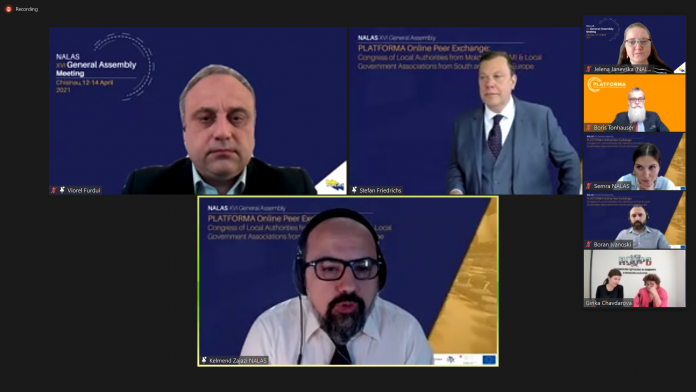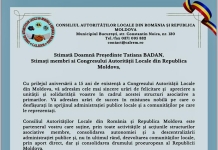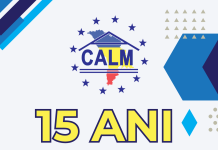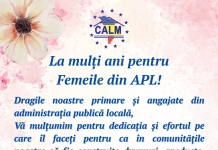The 16th NALAS General Assembly has started today with two side events – City to City Dialogue: Sharing experiences from the Urban Partnership Program and Peer Exchange of the Congress of Local Authorities from Moldova (CALM) and partner Local Government Associations from South and Eastern Europe.
This year’s General Assembly is a unique one for several reasons: it is being held online, allowing a wider audience of Mayors, local government staff and practitioners to join, exchange and learn. It is organised in collaboration with a number of international partners and it offers a very rich programme, consisted of six different events that tackle contemporary topics of interest of local governments in South-East Europe.
City to City Dialogue
The first event, City to City Dialogue, brought together over 150 participants and successfully rounded up the World Bank – Austria Urban Partnership Program (UPP), sharing its valuable legacy. Representatives of municipalities and cities around the Region presented their experiences with using the tools developed by the program, such as Municipal Finance Self-Assessment, Urban Audit and Citizens’ Score Cards. The event highlighted the good cooperation with NALAS and the helping hand it gives to contribute to the sustainability of UPP’s results.
“NALAS is a very unique organisation, with very big legitimacy and relevance”, said Ms. Catherine Farvacque-Vitkovic from UPP. “I see three main roles for NALAS in the future: 1. Serving as a repository of knowledge, 2. Acting as an accelerator for innovation, and 3. Catalyst for training of local staff and issues”.
Mr. Elton Stafa, NALAS Project Manager, presented NALAS Regional Decentralisation Observatory, available at https://nalas-observatory.eu. “This is a comprehensive data repository on local government issues in South-East Europe, aimed to support the creation of better policies and providing better local services to citizens”, said Mr. Stafa.
Ms. Božana Šljivar, from the City of Banja Luka, Bosnia and Herzegovina and Ms. Marina Jandrevska, from the Municipality of Kisela Voda, Skopje, North Macedonia, spoke about the importance of the Municipal Finance Self-Assessment tool in capital investment planning, emphasising that the tool enables municipal officers to project different scenarios, over different time horizons, as a basis for decision-making of the Mayor and the City Council.
Mr. Krste Micalevski, from the Municipality of Resen, North Macedonia, spoke about their experience with the Urban Audit, highlighting that finding the relevant statistical data was one of the key challenges. In the same time, the most important thing was citizens’ participation in the process.
Mr. Dejan Vujić, from the City of Banja Luka, Bosnia and Herzegovina; and Ms. Merita Toska, from Co-Plan Institute for Habitat Development elaborated on using MFSA for COVID-19 impact assessment. They concluded that the tool is equally useful for ordinary and extraordinary events. It enables municipalities to analyse the impact of any event on municipal finances, making scenarios and simulations.
During the session on Citizen Engagement, Mr. Sasho Trajkov, from Gazi Baba Municipality in Skopje, North Macedonia, Ms. Vesna Garvanlieva, from the Centre for Economic Analysis, North Macedonia and Ms. Sandra Kdolsky, from the World Bank, discussed the involvement of citizens in the development of their communities and the use of the so-called Citizens’ Score Cards.
“Obviously, citizens participation has to be adapted during the COVID-19 and similar crisis. That can be done by blending traditional engagement and digital solutions”, said Ms.Kdolsky.
In the closing session, representatives of Local Government Associations and local government experts shared the challenges and opportunities on local government finance in Western Balkans they expect in the upcoming year.
The main challenges are related to post COVID-19 social and economic recovery, which is coming with serious cuts of municipal budgets. The expected opportunities can come with improved relations between the central and local level, and a real decentralisation that will enable local governments to respond to citizens’ immediate needs and ensure community development. In addition, regional cooperation and learning from each other, as well as an inevitable digitalisation shall bring new opportunities. The role for Local Government Associations remains key in safeguarding local government finances and high quality of local services.
“UPP brought together city representatives from seven countries of the SEE region and beyond to exchange and to work together on the issues important to local governments all around the world. In 2011 the Program started modestly with only 10 cities while today we have over 120 cities and municipalities of all sizes joining the Program. It has been a great joy and pleasure to take this path together and have all of you and NALAS as our partners”, said Ms. Tamara Nikolic from UPP. “Our partnership with NALAS has been very important and NALAS has been a key partner in implementation of number of different initiatives so far, including e-learning academy, City to City dialogues, our flagship knowledge exchange events – Mayors Symposium, summer school on municipal finance and most recently on providing continuity and hosting the MFSA online tool. We look forward to the sustainability that NALAS will bring to this Program in the future”, concluded Ms. Nikolic.
PLATFORMA Peer Exchange: CALM and Local Government Associations from South and Eastern Europe
Our second event today offered a specific, tailor-made support to our members, the Congress of Local Authorities from Moldova, via peer exchange, organised in partnership with CEMR PLATFORMA.
“Peer Review is one of the most appreciated NALAS’ services”, said Mr. Kelmend Zajazi, Executive Director of NALAS in his opening address. “This service evolved over time, but its key ingredients of success are open discussion, support by peers and focus on specific issues. When I think about this service I think about CALM, that was established starting from such exchange. Here we are again, ten years after, to support CALM and learn from each other”, said Mr. Zajazi.
During the exchange, CALM received valuable advices on their financial sustainability, services to members and institutional dialogue, from peer Local Government Associations (LGAs), members of NALAS, but also from our partner LGAs from the Netherlands, Latvia, Lithuania and Norway.
“I would like to thank you all for your esteemed contributions to CALM’s development”, said Mr. Viorel Furdui, Executive Director of CALM. “We obviously operate in different contexts, but we have similar challenges and your experiences are giving us not only knowledge, but also hands-on advices that we can use in solving our burning issues”.









